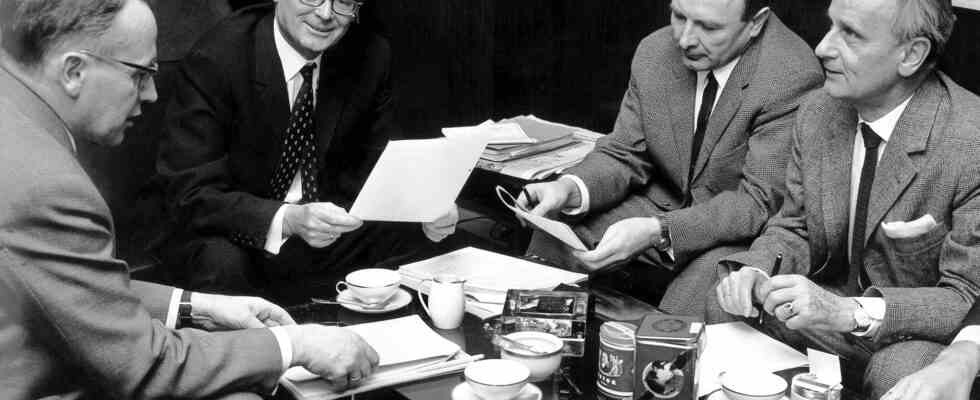Status: 01.06.2022 4:14 p.m
Chancellor Scholz wants to consult with employers and unions on how to tackle the high inflation – in a “concerted action”. However, the limits of this model became apparent decades ago.
Inflation at almost eight percent, price problems at gas stations and in grocery stores, falling purchasing power for savings – Chancellor Olaf Scholz knows that politicians have to act. In the general debate in the Bundestag, he referred to the relief packages and also made a suggestion: “Together with the social partners, we want to discuss how we are going to deal with the current price development.” That could be a “concerted action”, according to Scholz.
“Table of Social Reason”
The Chancellor is thus building on a model from the time of the grand coalition at the end of the 1960s. The then Economics Minister Karl Schiller had initiated talks between politicians, business associations, trade unions and the Bundesbank and spoke of a “table of social reason”. In line with the Stability Act passed in 1967, the aim was to reconcile growth, employment and price stability.
Keynesian economic theory, then dominant, suggested that high employment tended to be associated with higher inflation. The stability law should now bring about a balance between the various economic policy goals, and this is supported by the social partners.
But that only worked for a short time. On the one hand, because employers and unions feared interventions in collective bargaining autonomy – they didn’t want politicians to interfere in collective bargaining. The Bundesbank also took part in the talks, but made it clear that the independence of monetary policy should not be affected.
stagflation instead of stability
On the other hand, the economy developed differently than expected in the 1970s. The later Federal Chancellor Helmut Schmidt still said that he preferred five percent inflation to five percent unemployment – in line with the so-called “Phillips curve”, which assumed a negative correlation between inflation and unemployment.
But with the oil crisis came stagflation: the combination of inflation and weak growth, which at the time was also associated with rising unemployment.
When inflation feeds inflation
Many economists also see the danger of stagflation today if inflation is not curbed soon. The great concern is that a wage-price spiral could now set in: Because of the increased prices, the trade unions are demanding significantly higher wages, as in the 1970s. They burden the companies, which in turn could try to pass on the higher costs to customers in the form of higher prices. Inflation is feeding itself, economists warn.
A danger that Olaf Scholz apparently also fears, even if he expresses himself more cautiously. Regarding the problem of rising prices, he says: “We have to be careful that this does not result in a lasting development with inflation rates that are too high.”
One-time payments instead of permanently increasing standard wages?
In the Bundestag debate, it becomes clear: Scholz absolutely wants to avoid the impression that he wants to give the collective bargaining parties guidelines. At the same time, he knows that the upcoming collective bargaining negotiations will play a key role in determining how inflation will continue.
He praises the collective bargaining partners in the chemical industry, who have chosen an “interesting path” with a one-time special payment for the employees. One-off payments can compensate for the loss of purchasing power caused by inflation, but do not permanently burden the company’s costs.
Employers and unions ready to talk
Perhaps for this very reason, employers reacted quite positively to Scholz’s proposal. “Employers’ associations and trade unions have always worked constructively to find solutions in previous crises,” explains BDA President Rainer Dulger. “We will do it this time too.”
Yasmin Fahimi, the new chairwoman of the German Trade Union Confederation (DGB), is also giving positive signals. “The aim of concerted action must be to alleviate the current burdens on private households and the economy and to develop a more resilient and sustainable economy,” says Fahimi. She adds, however, as a qualification: Collective bargaining is “not conducted in the Chancellery”.
Potentially difficult trade-offs
This already indicates that a “concerted action”, i.e. the voluntary coordination of interests, has its limits. The further apart the interests of employers and trade unions are, the more difficult it becomes to find compromises.
This was also shown by Karl Schiller’s “Concerted Action”. When employers and unions fell out over co-determination, the format was officially ended in 1978.
Chancellor Scholz proposes “concerted action” against high inflation
Hans-Joachim Vieweger, ARD Berlin, June 1, 2022 3:00 p.m

